Charging Solutions
Every customer has a different charging need. Ford Pro gives you a broad range of home, work depot and public charging options as well as the connectivity tools to maximise vehicle productivity.
If you have any questions about Ford electric vehicles or charging electric vehicles, our team are on hand to help you.
Home Charging
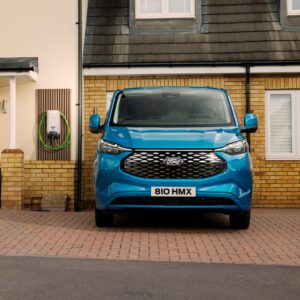 Home Charger only £10 with New Ford Pro Electric Vehicles†
Home Charger only £10 with New Ford Pro Electric Vehicles†
Kickstart your electrification journey for less with Ford Pro! Get the full Ford Pro Charging Solution
for just £10 with every All-Electric E-Transit, E-Transit
Custom, E-Transit Courier or Ranger Plug-in Hybrid purchase, including:
• Ford Pro EV Home Charger††
• Standard Installation
• 12months free Ford Pro Charging Software**
• Ford Pro Aftercare Support
The standard retail price for this package is £833 ex. VAT, so make sure you take advantage of this
exciting promotion when purchasing a new vehicle.
Home Charging
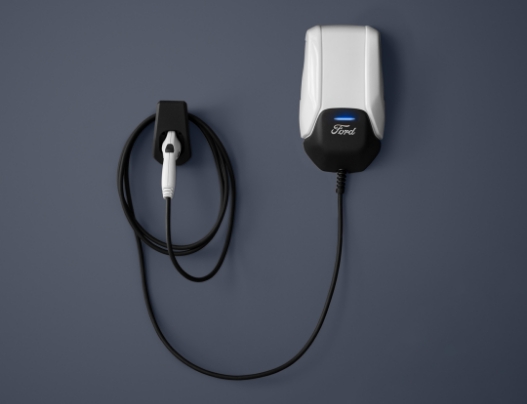
Taking work home? It’s never been easier to power your vehicle, with Home Charging. We can supply and fit a Home EV Charger or use the universal charge cord provided with your vehicle for overnight power.
It’s easy to check if your fleet’s ready for business, with remote alerts to confirm your vehicle is charging. There’s automatic home reimbursement expense reporting too.
Alternatively, you can buy a Home Charger directly and arrange installation yourself via a certified electrician. Contact our team today to learn more about purchasing your own Home Charger.
Enquire NowDepot Charging
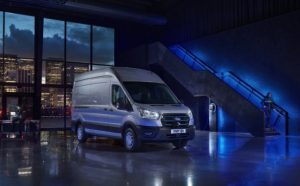 Installing Ford connected chargers at your business site will ensure your vehicles are always charged and work ready.
Installing Ford connected chargers at your business site will ensure your vehicles are always charged and work ready.
Ford can provide the full package for your depot charging requirements; all your charging hardware, charging point installation and maintenance; along with software management system. Fast charging points will mean your electric vehicles are quick to recharge and ready to go.
Businesses can also schedule and supervise all-electric vehicle charging with Ford Pro™ E-Telematics.
Contact UsPublic Charging
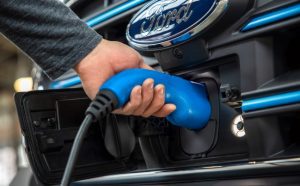
The BlueOvalTM Charge Network gives you easy access to over 300,000 charge points, over 16,000 which are in the UK, including high speed IONITY charging stations. With in-vehicle Ford Charge Assist, you can easily locate convenient charging along your route and provide real-time availability, cost and charging speed information for your selected charging point.
What Affects EV Range?
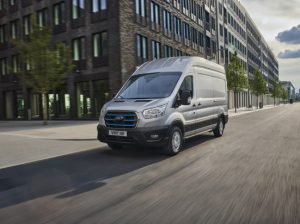 There are three main factors that can affect the driving range of a full electric vehicle:
There are three main factors that can affect the driving range of a full electric vehicle:
Heavy acceleration and high speeds
• In any type of vehicle, accelerating fast will use more power and reduce range. This applies to Internal Combustion Engines (ICE) and Electric Vehicles (EV).
• Likewise, faster speeds create exponentially more wind and road resistance, impacting on range.
Climate and temperature
• Extreme heat or cold temperatures outside have the potential to affect battery range, directly. All electric vehicles (EV’s) have less energy when in cold temperatures compared to warm temperatures due to battery cell chemistry.
• Heating and cooling the inside of the vehicle for passenger comfort also has an impact.
Payload
• Transporting more weight in the form of heavy cargo or multiple passengers results in greater energy consumption.
Important Information
*Available to eligible retail and small business customers for new vehicles contracted between 1st April 2025 and 30th June 2025. Offer may be withdrawn or amended without further notice. Customer acknowledges and agrees that the discounted charger and its installation is conditional on the purchase of a Ford Pro™ Electric Vehicle (E-Transit, E-Transit Custom,
E-Transit Courier, Ranger Plug-in Hybrid). Customer further agrees that in the event that the Customer cancels their vehicle order after the installation of the charger has occurred the Customer shall be liable and pay Ford on demand for the charger and installation costs £832.50 plus VAT.
**Ford Pro™ Charging Software is complimentary for 12 months from charger installation date after which subscription charges of £8 per month shall apply. Terms and conditions apply.
Charging fees payable separately.
†Charger designs may vary.




